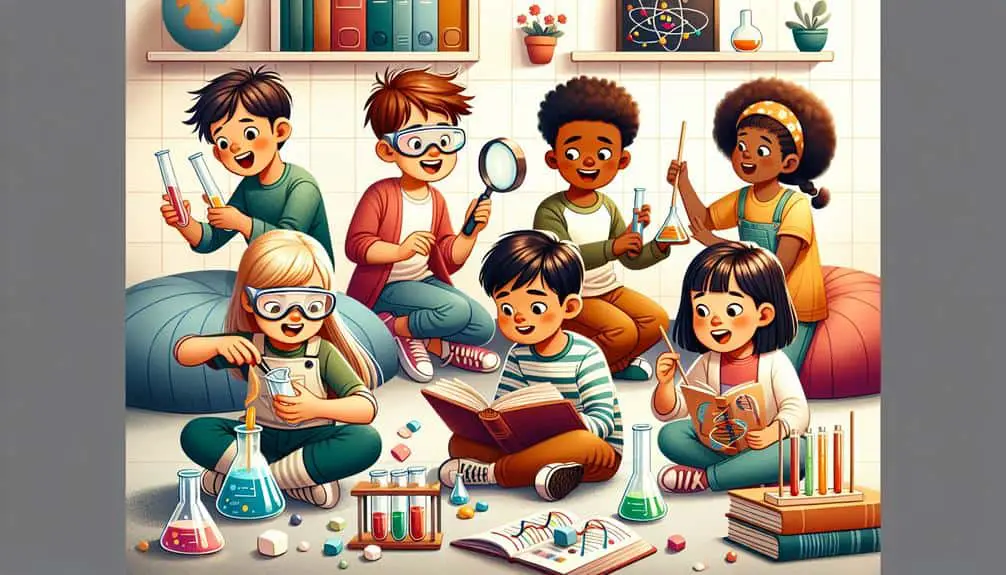Discover the top 10 Charlotte Mason curriculum picks. Immerse in living books for literature studies that ignite character growth. Engage in nature studies and outdoor learning for deeper scientific connections. Uncover art and music appreciation to enrich critical thinking. Journey through history with living narratives. Cultivate character and instill habits like perseverance. Explore hands-on science experiments for a practical understanding. Embrace foreign languages and diverse cultures. Explore composer and artist studies for enhanced creativity. Harness the power of timeless math resources. This curriculum is a holistic approach to education that nurtures minds and hearts.
Key Points
- Utilize living books for literature studies to promote character development and critical thinking skills.
- Incorporate nature study and outdoor learning for a deep connection with the natural world.
- Explore visual arts and music appreciation to develop critical thinking and auditory senses.
- Integrate history through living narratives and geography exploration for a holistic understanding.
- Focus on character development and habit training through perseverance, responsibility, and diligence.
Living Books for Literature Studies
Discover the captivating domain of literature studies with Charlotte Mason's recommended selection of living books. In her curriculum, character development is at the heart of education, and classic literature plays a vital role in shaping young minds.
Classic literature, such as works by Jane Austen, Charles Dickens, and Louisa May Alcott, not only exposes children to rich language and diverse storytelling but also offers profound insights into human nature and moral dilemmas. Through the experiences of well-developed characters, students are able to witness the complexities of human behavior, fostering empathy and critical thinking skills.
Nature Study and Outdoor Learning
Explore the wonders of nature through engaging in-depth Nature Study sessions that allow your children to observe, sketch, and document the beauty around them.
Take learning outdoors with hands-on activities like scavenger hunts, plant identification walks, and cloud watching to foster a deep connection with the natural world.
Nature Study Benefits
Engaging in nature study and outdoor learning offers homeschoolers a unique opportunity to foster a deep connection with the natural world and cultivate a sense of wonder and curiosity about the environment around them.
Through outdoor exploration, homeschoolers can observe firsthand the intricate workings of ecosystems, the changing seasons, and the diverse flora and fauna that inhabit their surroundings. This hands-on experience facilitates scientific observation, allowing students to develop critical thinking skills and a deeper appreciation for the beauty and complexity of nature.
Outdoor Learning Activities
Immerse yourself in the wonders of outdoor learning activities, specifically nature study, to deepen your connection with the natural world and enhance your scientific observation skills.
Exploring nature through outdoor adventures not only provides a rejuvenating break from indoor routines but also offers a myriad of educational benefits. Engaging in nature study allows you to observe the intricate ecosystems, identify different plant and animal species, and understand environmental concepts firsthand.
Through these outdoor adventures, you can develop a sense of stewardship towards the environment and cultivate a curiosity for the world around you. Nature study fosters a love for learning, encourages physical activity, and promotes mindfulness.
Art and Music Appreciation
Art and music appreciation are integral components of a well-rounded education, enriching the minds and souls of students through exposure to diverse creative expressions. Art appreciation allows students to explore the world of visual arts, understanding different styles, techniques, and the stories behind famous artworks. By studying art, students develop critical thinking skills and learn to express themselves creatively.
Music exploration, on the other hand, exposes students to a variety of musical genres, composers, and instruments. It helps cultivate an appreciation for music's role in history, culture, and emotions. Through listening to classical masterpieces, folk tunes, and contemporary pieces, students not only enhance their auditory senses but also develop an understanding of the power of music to convey messages and evoke feelings.
Integrating art and music into the curriculum provides homeschoolers with a holistic educational experience that nurtures both their intellect and their creativity.
History Through Living Narratives
Exploring historical narratives through the lens of lived experiences brings the past vividly to life, fostering a deeper understanding of the interconnectedness of events and the human stories behind them. Historical biographies, narrated in a compelling manner, offer a window into different time periods, allowing you to immerse yourself in the lives of individuals who shaped history. These narratives provide context to historical events, making them more relatable and engaging.
When learning history through living narratives, you can step into the shoes of people from the past, experiencing their triumphs and struggles firsthand. This living history approach offers an immersive experience, enabling you to appreciate the complexities of different eras in a more profound way. By delving into the personal accounts and perspectives of historical figures, you gain insights that standard textbooks often fail to convey.
Engaging with historical biographies and living narratives not only enhances your knowledge of the past but also cultivates empathy and critical thinking skills. Through these immersive experiences, you develop a deeper appreciation for the human experiences that have shaped our world.
Character Development and Habit Training
Engaging with historical biographies and living narratives lays a strong foundation for character development and habit training in the context of homeschooling. By immersing yourself in the lives of historical figures through rich narratives, you can glean valuable insights into how character traits such as perseverance, courage, and integrity are developed and demonstrated. These stories serve as real-life examples that can inspire and guide your own character development journey.
Moreover, habit training is intricately woven into the fabric of daily life within a Charlotte Mason homeschooling approach. Through consistent practice and gentle guidance, habits such as attentiveness, responsibility, and diligence are cultivated. By incorporating living books that emphasize the importance of these habits, you create an environment that encourages their growth naturally.
In essence, character development and habit training go hand in hand, shaping not only the academic but also the moral and practical aspects of a child's education. Through the intentional selection of literature that highlights these themes, homeschoolers can nurture virtues and habits that will serve them well throughout their lives.
Geography Exploration With Living Books
Immerse yourself in the world of geography through the captivating lens of living books, fostering a dynamic exploration that enriches both knowledge and imagination.
Engaging in geography exploration activities with living books allows you to journey to distant lands, understand diverse cultures, and grasp the intricacies of the world around you. By delving into literary connections that highlight different regions and their unique characteristics, you can develop a deeper appreciation for the beauty and complexity of our planet.
Through these living books, you can initiate virtual journeys, following adventurers, explorers, and locals as they traverse mountains, cross oceans, and navigate bustling cities. By integrating exploration activities like map studies, nature walks, and cultural investigations, you can bring geography to life in a vivid and memorable way.
These experiences not only enhance your geographical knowledge but also spark your curiosity and creativity, making learning a truly immersive and enriching experience.
Science Through Hands-On Experiments
When it comes to science education, hands-on experiments are key to fostering a deeper understanding of scientific concepts.
By engaging in practical activities, you not only learn the theory but also get to experience the principles in action.
Experiential learning through experiments provides a tangible way to grasp complex scientific ideas.
Experiential Science Learning
Incorporate hands-on experiments into your science curriculum to enhance your child's experiential learning experience. By engaging in hands-on experiments, your child can actively participate in the scientific process, fostering a deeper understanding of scientific concepts.
Outdoor exploration provides a rich environment for learning through observation and interaction with the natural world. Encourage your child to explore the outdoors, make observations, and conduct experiments outside whenever possible.
This experiential approach to science learning not only makes the subject more engaging but also helps in the retention of knowledge. Through hands-on experiments and outdoor exploration, your child can develop critical thinking skills, problem-solving abilities, and a lifelong love for science.
Practical Hands-On Activities
Engage your child in practical hands-on activities to deepen their understanding of scientific concepts through experiential learning. Hands-on experiments offer a unique opportunity for children to explore scientific principles in a tangible way.
Encourage outdoor exploration to connect classroom learning to the natural world. By observing the environment, collecting samples, and conducting experiments outdoors, children can develop a deeper appreciation for science.
Through hands-on activities, children can witness scientific phenomena firsthand, fostering a sense of curiosity and inquiry. These interactive experiences not only enhance comprehension but also make learning enjoyable and memorable.
Encourage your child to roll up their sleeves, get their hands dirty, and immerse themselves in the wonders of science through practical experimentation and outdoor exploration.
Foreign Language Studies
Exploring a foreign language in your Charlotte Mason curriculum can open new doors to cultural understanding and communication skills. Learning a new language goes beyond just words; it involves cultural immersion and language fluency, providing you with a deeper appreciation for different ways of life. Here are five key elements to ponder when incorporating foreign language studies into your homeschooling:
- Interactive Learning: Engage in activities that foster conversation practice, such as language exchanges or virtual language immersion programs.
- Real World Application: Apply language skills in practical situations like preparing recipes from the target culture or watching foreign films with subtitles.
- Cultural Exploration: Delve into the traditions, history, and customs of the language you're learning to gain a holistic understanding of the culture.
- Language Games: Include enjoyable games like language bingo or vocabulary-building activities to make learning enjoyable and effective.
- Multi-Sensory Approach: Utilize resources that cater to different learning styles, such as audio books, flashcards, and interactive online platforms for a well-rounded language learning experience.
Composer and Artist Study
When studying Composer and Artist appreciation in your homeschool curriculum, you'll find a wide array of activities to help your children engage with classical music and famous artworks.
By incorporating Composer Appreciation Activities and utilizing various Artist Study Resources, your children can develop a deeper understanding and appreciation of the arts.
These studies can enrich their cultural knowledge and foster creativity in a meaningful and enjoyable way.
Composer Appreciation Activities
Studying the works of composers and artists can enrich your homeschool curriculum through engaging activities that foster a deeper appreciation for music and visual arts. Delving into composer biographies provides insight into the lives and inspirations behind the music they created.
Music appreciation activities can include listening to a variety of musical pieces from different eras, discussing the emotions evoked by the music, and even trying your hand at creating your compositions. Exploring how various composers have influenced each other over time can reveal the interconnectedness of musical history.
Additionally, organizing mini-concerts at home where you showcase the works of different composers can make the learning experience more interactive and enjoyable.
Artist Study Resources
To deepen your understanding and appreciation of art and music within your homeschool curriculum, consider utilizing a variety of artist study resources that encompass both composer and artist studies. When delving into famous artists, explore the works of renowned painters like Leonardo da Vinci, Vincent van Gogh, or Frida Kahlo. These artists offer diverse styles and themes to enrich your homeschool art curriculum.
Additionally, incorporating different art techniques such as watercolor, acrylics, or sketching into your studies can provide a hands-on learning experience for your children. Understanding the methods and styles of various artists can inspire creativity and critical thinking.
Timeless Math Resources
Discover a selection of timeless math resources that have proven effective in enhancing homeschoolers' understanding and mastery of mathematical concepts.
- Hands-On Equations: This program uses physical game pieces to help students understand and solve algebraic equations in a visual and tactile way.
- Math-U-See: Known for its manipulatives, this curriculum allows students to physically interact with math concepts, making abstract ideas more concrete.
- Singapore Math: With its focus on problem-solving and model drawing, this curriculum engages students in practical applications of math using pictorial representations.
- RightStart Mathematics: By incorporating the AL Abacus and other manipulatives, this program emphasizes a multi-sensory approach to learning math.
- Beast Academy: Combining comic book style with challenging math problems, this curriculum keeps students engaged while honing their problem-solving skills.
These resources not only promote a deeper understanding of mathematical principles but also foster a love for math through hands-on engagement with manipulatives.



